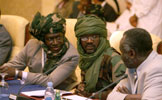
Following a week of “talks about talks,” the Sudanese government and the Justice and Equality Movement, Darfur’s most powerful rebel group, have signed an “Agreement of Good Will and Confidence Building For the Settlement of the Problem in Darfur.” The agreement, signed in Doha, is intended as a confidence-building measure to pave the way toward an inclusive peace process. Khartoum and the JEM agreed to end to attacks on displaced persons, allow unobstructed delivery of humanitarian aid, and exchange prisoners. This is a step forward, albeit at very modest one. After more than five years of broken agreements, this accord ought not be hailed as a major breakthrough until we see tangible results on the ground. Mistrust between the parties is clearly still high. The JEM’s leader Dr. Khalil Ibrahim reportedly refused to sign the agreement himself, forcing Sudanese negotiator Nafie Ali Nafie to find his own proxy. The result: an agreement signed by Khalil’s brother and the Sudanese Minister of State for Culture, Youth, and Sports. Not exactly a sign of commitment by either side.
What is most significant in the deal—and perhaps most promising—is that neither side got exactly what they wanted. The JEM entered into this round of talks with the objective of securing bi-lateral talks with Khartoum and sidelining other rebel groups, yet the Qatari Foreign Minister has stated clearly that other rebel groups are welcome to sign the document. The Government of Sudan hoped to achieve a diplomatic breakthrough significant enough to make a compelling case for the suspension of the ICC case against President Bashir. United States Ambassador to the United Nations Susan Rice was quick to put any such notion to rest.
With proper follow through, today’s deal could pave the way for just the sort of inclusive peace process for which Enough, the Save Darfur Coalition, and others have consistently advocated. Doha appears to be the venue for new negotiations, which could begin as early as the first week in March. However, multiple spoilers lurk. Egypt and Libya are resentful that Qatar has muscled into their traditional domain of influence. The Chadian government depends on JEM’s support for its own survival against rebels backed by Khartoum. And Darfur’s other rebel factions have rejected the deal.
Now is a perfect time for the Obama administration to announce a special envoy to help bring about coordinated leverage supporting a U.N./AU led peace process. Moreover, the United States needs to work with its allies—particularly France—to ensure that Egypt, Libya, and Chad are supportive of the process, and that Darfur’s other rebel groups understand that new peace talks are the only way forward.
Colin Thomas-Jensen contributed to this post.

